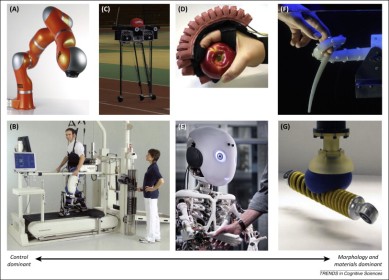
From Pfeifer, Iida and Lungarella (2014)
Tomorrow I’m giving an invited talk in Gothenburg at the Symposium on Morphological Computing and Cognitive Agency, as part of the The International Society for Information Studies Summit 2017 (entitled — deep breath — “DIGITALISATION FOR A SUSTAINABLE SOCIETY: Embodied, Embedded, Networked, Empowered through Information, Computation & Cognition!”). Here’s my title and abstract:
Roles for Morphology in Computation
The morphological aspects of a system are the shape, geometry, placement and compliance properties of that system. On the rather permissive construal of computation as transformations of information, a correspondingly permissive notion of morphological computation can be defined: cases of information transformation performed by the morphological aspects of a system. This raises the question of what morphological computation might look like under different, less inclusive accounts of computation, such as the view that computation is essentially semantic. I investigate the possibilities for morphological computation under a particular version of the semantic view. First, I make a distinction between two kinds of role a given aspect might play in computations that a system performs: foreground role and background role. The foreground role of a computational system includes such things as rules, state, algorithm, program, bits, data, etc. But these can only function as foreground by virtue of other, background aspects of the same system: the aspects that enable the foreground to be brought forth, made stable/reidentifiable, and to have semantically coherent causal effect. I propose that this foreground/background distinction cross-cuts the morphological/non-morphological distinction. Specifically, morphological aspects of a system may play either role.
The Symposium will be chaired by Rob Lowe, and Gordana Dodig Crnkovic, and the other speakers include Christian Balkenius, Lorenzo Magnani, Yulia Sandamirskaya, Jordi Vallverdú, and John Spencer (and maybe Tom Ziemke and Marcin Schroeder?).
I’m also giving an invited talk the next day (Tuesday) as part of a plenary panel entitled: “What Would It Take For A Machine To Have Non-Reductive Consciousness?” My talk is entitled “Computation and the Fate of Qualia”. The other speakers are Piotr Bołtuć (moderator), Jack Copeland, Igor Aleksander, and Keith W. Miller.
Should be a fantastic few days — a shame I can’t stay for the full meeting, but I have to be back at Sussex in time for the Robot Opera Mini-Symposium on Thursday!
